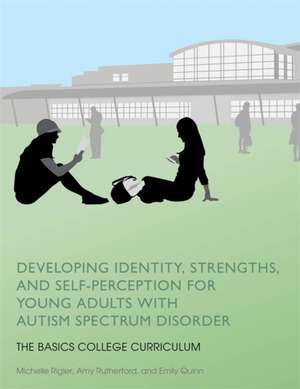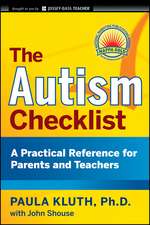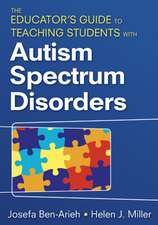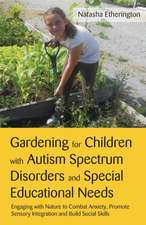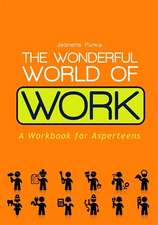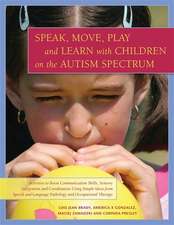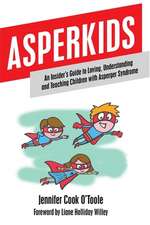Developing Identity, Strengths, and Self-Perception for Young Adults with Autism Spectrum Disorder: Basics College Curriculum, cartea 2
Autor Michelle Rigler, Amy Rutherford, Emily Quinnen Limba Engleză Paperback – 20 iun 2015
Preț: 204.00 lei
Preț vechi: 261.41 lei
-22% Nou
Puncte Express: 306
Preț estimativ în valută:
39.04€ • 41.74$ • 32.55£
39.04€ • 41.74$ • 32.55£
Carte disponibilă
Livrare economică 27 martie-10 aprilie
Preluare comenzi: 021 569.72.76
Specificații
ISBN-13: 9781849057974
ISBN-10: 1849057974
Pagini: 224
Ilustrații: 22 black and white
Dimensiuni: 214 x 276 x 14 mm
Greutate: 0.66 kg
Editura: JESSICA KINGSLEY PUBLISHERS
Seriile The BASICS College Curriculum, Basics College Curriculum
ISBN-10: 1849057974
Pagini: 224
Ilustrații: 22 black and white
Dimensiuni: 214 x 276 x 14 mm
Greutate: 0.66 kg
Editura: JESSICA KINGSLEY PUBLISHERS
Seriile The BASICS College Curriculum, Basics College Curriculum
Notă biografică
Michelle Rigler, EdD, is Director of the Disability Resource Center at The University of Tennessee at Chattanooga and Director of the MoSAIC Program for students with Autism Spectrum Disorder on which the BASICS Curriculum is based. Having completed a Master's Degree in Special Education and worked for a number of years as a special education teacher, she embarked on a career in Higher Education in 2004 and received a Doctorate in Education in Learning and Leadership. Amy Rutherford is Program Coordinator as well as a coach and instructor on the Disability Resource Center's MoSAIC Program for students with Autism Spectrum Disorder at the University of Tennessee at Chattanooga. She has a Master's Degree in Mental Health Counseling with a focus on Autism Spectrum Disorders. Emily Quinn is Access Coordinator for the Disability Resource Center and serves in the role of coach and instructor for the MoSAIC Program for Students with Autism Spectrum Disorder at the University of Tennessee at Chattanooga. She is currently pursuing a Master's Degree in Special Education.
Cuprins
Introduction. 1. Personal Stories. Lesson 1: Early Childhood. Lesson 2: Teen Years. Lesson 3: Young Adulthood. Lesson 4: Writing Your Own Story. 2. The Language of ASD. Lesson 1: Identity Models. Lesson 2: Diagnostic Language. Lesson 3: Identity Language. Lesson 4: Diagnostic Criteria and the Impact on Community. Lesson 5: Owning ASD. 3. ASD in the Media. Lesson 1: Development of Perceptions through Popular Media. Lesson 2: ASD in the News. Lesson 3: ASD in Movies and Television. Lesson 4: ASD through Social Media. 4. Identifying Your Strengths. Lesson 1: Success and ASD Qualities. Lesson 2: Identifying the Established Strengths in ASD. Lesson 3: Recognizing Your Individual Strengths. Lesson 4: Replacing Negative Self-Perceptions. Lesson 5: Reframing Your View. 5. Developing Your Core Identity. Lesson 1: Identifying What Makes You Calm, Passionate, and Anxious. Lesson 2: Developing Your Core Identity Features. Lesson 3: It is Rarely Black and White. Lesson 4: The Intersection of Your Core Identity Features. 6. Social Rules and Social Confusion. Lesson 1: Social Confusion and Establishing Purpose. Lesson 2: Rules of Social Engagement. Lesson 3: Building Your Social First Aid Kit. Lesson 4: Digging Your Way Out. 7. Building Your Team. Lesson 1: Understanding Your Preferences. Lesson 2: Recognizing the Preferences of Others. Lesson 3: Partnering Preferences to Build Teams. Lesson 4: Roles in Work Teams/Groups. 8. Changing the Goal. Lesson 1: Looking Forward. Lesson 2: Choosing the Right Academic Major. Lesson 3: The Career Continuum. Lesson 4:An Introduction to Community Service, Job Shadowing, and Internships. Lesson 5: Mentors and Career Preparation. Next Steps. Appendix A - BASICS Chart Student Example. Appendix B - Guided Discussion. References.
